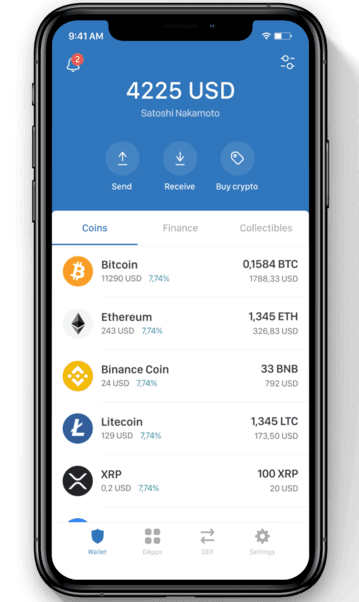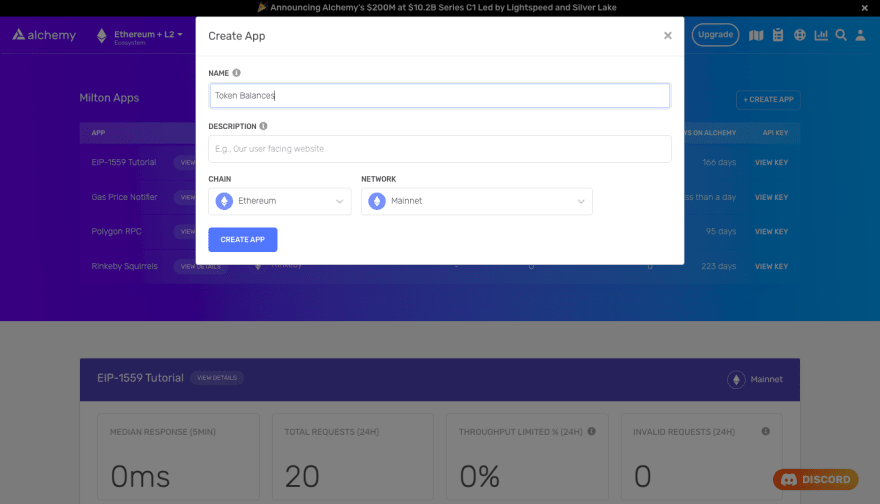How to Get All Tokens Owned by an Address
Learn how to get balances of all tokens owned by an address using the Alchemy Token API.
API Endpoint
This tutorial uses the alchemy_getTokenBalances endpoint.
If you just need the script for this tutorial refer to the below Recipe or continue reading for more
Most dapps, whether they are exchanges, DeFi protocols, wallets, or analytics platforms, require that their users are able to view all their tokens and token balances at one place.

Digital asset wallet interface that shows the token balances of multiple cryptocurrencies.
To get all the tokens owned by a wallet on Ethereum, you would typically have to index the entire blockchain since genesis, track all ERC-20 contracts, and compute token balances of wallets.
This process typically requires a massive amount of engineering resources and time.
However, this effort can be bypassed by using Alchemy's Token API to get the balances of all tokens owned by a wallet address.
About this Tutorial
We will write a simple script in Node to get the balances of the top 100 tokens (by volume) on the Ethereum blockchain using a free Alchemy developer account and Alchemy's Token API.
Creating the Token Balances Script
Step 1: Install Node and npm
In case you haven't already, install node and npm on your local machine.
Make sure that node is at least v14 or higher by typing the following in your terminal:
node -v
Step 2: Create an Alchemy app
In case you haven't already, sign up for a free Alchemy account.

Alchemy's account dashboard where developers can create a new app on the Ethereum blockchain.
Next, navigate to the Alchemy Dashboard and create a new app.
Make sure you set the chain to Ethereum and the network to Mainnet.
Once the app is created, click on your app's View Key button on the dashboard.
Take note of the HTTP URL.
The URL will be in this form: https://eth-mainnet.g.alchemy.com/v2/xxxxxxxxx
You will need this later.
Step 3: Create a node project
Let's now create an empty repository and install all node dependencies.
To make requests to the Token API, use the Alchemy SDK.
You can also use axios or fetch alternatively.
mkdir token-balances && cd token-balances
npm init -y
npm install --save alchemy-sdk
touch main.js
mkdir token-balances && cd token-balances
npm init -y
npm install --save axios
touch main.js
mkdir token-balances && cd token-balances
npm init -y
npm i [email protected]
touch main.js
This will create a repository named token-balances that holds all your files and dependencies.
Next, open this repo in your favorite code editor.
We will be writing all our code in the main.js file.
Step 4: Get token balances of an address
To get token balances, you will use the getTokenBalances method.
This method takes one argument:
DATA: The wallet address of which we want to get token balances.
Add the following code to the main.js file.
// Setup: npm install alchemy-sdk
const { Alchemy, Network } = require("alchemy-sdk");
const config = {
apiKey: "<-- ALCHEMY API KEY -->",
network: Network.ETH_MAINNET,
};
const alchemy = new Alchemy(config);
const main = async () => {
// Wallet address
const address = "0xd8da6bf26964af9d7eed9e03e53415d37aa96045";
// Get token balances
const balances = await alchemy.core.getTokenBalances(address);
console.log(`The balances of ${address} address are:`, balances);
};
const runMain = async () => {
try {
await main();
process.exit(0);
} catch (error) {
console.log(error);
process.exit(1);
}
};
runMain();
const axios = require("axios");
// Wallet address
const address = "0xd8da6bf26964af9d7eed9e03e53415d37aa96045";
// Alchemy URL --> Replace with your API key at the end
const baseURL = `https://eth-mainnet.g.alchemy.com/v2/<ALCHEMY-API-KEY>`;
// Data for making the request to query token balances
const data = JSON.stringify({
jsonrpc: "2.0",
method: "alchemy_getTokenBalances",
headers: {
"Content-Type": "application/json",
},
params: [`${address}`],
id: 42,
});
// config object for making a request with axios
const config = {
method: "post",
url: baseURL,
headers: {
"Content-Type": "application/json",
},
data: data,
};
// Make the request and print the formatted response:
axios(config)
.then((response) => console.log(response["data"]["result"]))
.catch((error) => console.log("error", error));
// importing fetch for making requests
const fetch = require("node-fetch");
// ALCHEMY URL --> Replace with your API Key at the end
const url = "https://eth-mainnet.g.alchemy.com/v2/<ALCHEMY-API-KEY>";
let WETHContractAddress = "0xC02aaA39b223FE8D0A0e5C4F27eAD9083C756Cc2";
// REQUEST OPTIONS
const options = {
method: "POST",
headers: { accept: "application/json", "content-type": "application/json" },
body: JSON.stringify({
id: 1,
jsonrpc: "2.0",
method: "alchemy_getTokenMetadata",
params: [WETHContractAddress],
}),
};
// MAKE THE REQUEST AND PRINT THE RESPONSE
fetch(url, options)
.then((res) => res.json())
.then((json) => console.log(json))
.catch((err) => console.error("error:" + err));
Run the script using:
node main.js
You should obtain an output that looks something like this:
The balances of 0xd8da6bf26964af9d7eed9e03e53415d37aa96045 address are: {
address: '0xd8da6bf26964af9d7eed9e03e53415d37aa96045',
tokenBalances: [
{
contractAddress: '0x000000a1a6cb569ee64e1f8c3529390113e34cf8',
tokenBalance: '0x000000000000000000000000000000000000000078b2ef682a5071579d3e6b16'
},
{
contractAddress: '0x0027449bf0887ca3e431d263ffdefb244d95b555',
tokenBalance: '0xffffffffffffffffffffffffffffffffffffffffffffffffffffffffffffffff'
}
Step 5: Add metadata and parse API output
The output generated in the previous step is not very human-readable. It only gives us information that tells us the contract address of the token and the balance in its smallest unit.
To get more relevant information about the token such as name, symbol, and the number of decimals, we need to leverage another method called getTokenMetadata.
The alchemy_getTokenMetadata method takes a single argument of the contract address and returns data in the following format:
{
decimals: 6,
logo: 'https://static.g.alchemy.com/images/assets/825.png',
name: 'Tether',
symbol: 'USDT'
}
We will use this method in conjunction with getTokenBalances method, to write code that does the following:
- Remove all tokens with zero balances.
- Loop through all tokens and extract metadata using the
getTokenMetadatamethod. - Convert token balances to a human-readable number.
- Print the token's name, balance, and symbol to the console.
The conversion of Token balances to human readable figures
The
tokenBalancereturned by the Token API is usually a number with several digits.In this case
4929853276for USDT.Every ERC20 token has a metadata information called "decimals" which denotes the divisibility of a token (ranges from 0 to 18).
For USDT, the value of "decimals" is 6.
The response returned by alchemy_getTokenBalances is as below.\
tokenBalance = no. of tokens (quantity) * Math.pow(10, 6)Hence, the actual quantity of the USDT token in this case will be
4929853276/10^6 = 4,929.853276The same operation needs to be done to obtain the actual quantity for any token.
We show the calculation in the code below
Replace the contents of main.js with the following:
// Setup: npm install alchemy-sdk
import { Alchemy, Network } from "alchemy-sdk";
const config = {
apiKey: "<-- ALCHEMY APP API KEY -->",
network: Network.ETH_MAINNET,
};
const alchemy = new Alchemy(config);
const main = async () => {
// Wallet address
const address = "0xd8da6bf26964af9d7eed9e03e53415d37aa96045";
// Get token balances
const balances = await alchemy.core.getTokenBalances(address);
// Remove tokens with zero balance
const nonZeroBalances = balances.tokenBalances.filter((token) => {
return token.tokenBalance !== "0";
});
console.log(`Token balances of ${address} \n`);
// Counter for SNo of final output
let i = 1;
// Loop through all tokens with non-zero balance
for (let token of nonZeroBalances) {
// Get balance of token
let balance = token.tokenBalance;
// Get metadata of token
const metadata = await alchemy.core.getTokenMetadata(token.contractAddress);
// Compute token balance in human-readable format
balance = balance / Math.pow(10, metadata.decimals);
balance = balance.toFixed(2);
// Print name, balance, and symbol of token
console.log(`${i++}. ${metadata.name}: ${balance} ${metadata.symbol}`);
}
};
const runMain = async () => {
try {
await main();
process.exit(0);
} catch (error) {
console.log(error);
process.exit(1);
}
};
runMain();
// importing axios for making requests
const axios = require("axios");
// Wallet address
const address = "0xC02aaA39b223FE8D0A0e5C4F27eAD9083C756Cc2";
// Alchemy URL --> Replace with your API key at the end
const baseURL = `https://eth-mainnet.g.alchemy.com/v2/<YOUR-API-KEY>`;
// Data for making the request to query token balances
const data = JSON.stringify({
jsonrpc: "2.0",
method: "alchemy_getTokenBalances",
headers: {
"Content-Type": "application/json",
},
params: [`${address}`],
id: 42,
});
// config object for making a request with axios
const config = {
method: "post",
url: baseURL,
headers: {
"Content-Type": "application/json",
},
data: data,
};
async function main() {
// fetching the token balances
let response = await axios(config);
response = response["data"];
// Getting balances from the response
const balances = response["result"];
// Remove tokens with zero balance
const nonZeroBalances = await balances.tokenBalances.filter((token) => {
return token.tokenBalance !== "0";
});
console.log(`Token balances of ${address}: \n`);
// Counter for SNo of final output
let i = 1;
// Loop through all tokens with non-zero balance
for (let token of nonZeroBalances) {
// Get balance of token
let balance = token.tokenBalance;
// options for making a request to get the token metadata
const options = {
method: "POST",
url: baseURL,
headers: {
accept: "application/json",
"content-type": "application/json",
},
data: {
id: 1,
jsonrpc: "2.0",
method: "alchemy_getTokenMetadata",
params: [token.contractAddress],
},
};
// getting the token metadata
const metadata = await axios.request(options);
// Compute token balance in human-readable format
balance = balance / Math.pow(10, metadata["data"]["result"].decimals);
balance = balance.toFixed(2);
// Print name, balance, and symbol of token
console.log(
`${i++}. ${metadata["data"]["result"].name}: ${balance} ${
metadata["data"]["result"].symbol
}`
);
}
}
main();
// importing fetch for making requests
const fetch = require("node-fetch");
// Address of which we want to find token balances
let address = "0xA0b86991c6218b36c1d19D4a2e9Eb0cE3606eB48";
// Alchemy URL for making requests --> Replace with your API Key at the end
const url =
"https://eth-mainnet.g.alchemy.com/v2/<YOUR-API-KEY>";
const options = {
method: "POST",
headers: { accept: "application/json", "content-type": "application/json" },
body: JSON.stringify({
id: 1,
jsonrpc: "2.0",
method: "alchemy_getTokenBalances",
params: [address],
}),
};
async function main() {
// fetching the token balances
let res = await fetch(url, options);
let response = await res.json();
// Getting balances from the response
const balances = response["result"];
// Remove tokens with zero balance
const nonZeroBalances = await balances.tokenBalances.filter((token) => {
return token.tokenBalance !== "0";
});
console.log(`Token balances of ${address}: \n`);
// Counter for SNo of final output
let i = 1;
// Loop through all tokens with non-zero balance
for (let token of nonZeroBalances) {
// Get balance of token
let balance = token.tokenBalance;
// request options for making a request to get tokenMetadata
const options = {
method: "POST",
headers: {
accept: "application/json",
"content-type": "application/json",
},
body: JSON.stringify({
id: 1,
jsonrpc: "2.0",
method: "alchemy_getTokenMetadata",
params: [token.contractAddress],
}),
};
// parsing the response and getting metadata from it
let res2 = await fetch(url, options);
let metadata = await res2.json();
metadata = metadata["result"];
// Compute token balance in human-readable format
balance = balance / Math.pow(10, metadata.decimals);
balance = balance.toFixed(2);
// Print name, balance, and symbol of token
console.log(`${i++}. ${metadata.name}: ${balance} ${metadata.symbol}`);
}
}
main();
Run the script again using:
node main.js
You should obtain an output that looks something like this:
Token balances of 0xd8da6bf26964af9d7eed9e03e53415d37aa96045
1. Tether: 0.10 USDT
2. USD Coin: 5.00 USDC
3. WETH: 0.05 WETH
4. ApeCoin: 1.00 APE
5. Mirror Protocol: 0.00 MIR
6. Shiba Inu: 3.14 SHIB
7. Dai: 764324.64 DAI
8. Loopring: 1000.32 LRC
9. SushiSwap: 0.00 SUSHI
10. Axie Infinity: 0.02 AXS
11. Ethereum Name Service: 1143.54 ENS
12. OMG Network: 123638.06 OMG
13. Basic Attention Token: 17.47 BAT
14. dYdX: 0.52 DYDX
15. Mask Network: 1.00 MASK
16. 1inch Network: 5.00 1INCH
17. Livepeer: 2.26 LPT
18. Request: 126.00 REQ
19. HEX: 100.00 HEX
Conclusion
Congratulations! You now know how to use the Alchemy Token API to get all tokens and token balances of any address on the Ethereum blockchain.
If you enjoyed this tutorial on how to get all tokens owned by an address, give us a tweet @AlchemyPlatform, or shoutout feedback to the authors @rounak_banik and @ankg404!
Don't forget to join our Discord server to meet other blockchain devs, builders, and entrepreneurs.
Ready to start using the Alchemy Token API?
Create a free Alchemy account and share your project with us!
Updated almost 2 years ago
